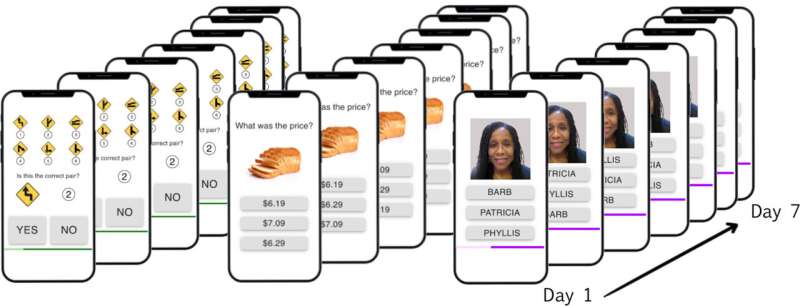This article has been reviewed according to Science X's editorial process and policies. Editors have highlighted the following attributes while ensuring the content's credibility:
fact-checked
peer-reviewed publication
trusted source
proofread
Daily learning test can detect Alzheimer's disease-related changes in memory among cognitively normal older adults

Detecting cognitive changes associated with Alzheimer's disease in older adults can be difficult in early stages of disease, but daily testing on smartphones may provide a less time-consuming and less labor-intensive way to reveal amyloid-related changes in memory.
Quicker, more sensitive methods of testing are especially important as research for the treatment of Alzheimer's disease moves toward the preclinical stage of disease, a time when people may be at different levels of risk and could have otherwise undetectable signs of decline.
A team of investigators from Mass General Brigham conducted a study to determine if assessing learning over several days could reveal Alzheimer's disease-related changes in memory. Researchers found that the smartphone-based cognitive testing detected Alzheimer's-related cognitive changes in otherwise normal older adults. Results are published in Annals of Neurology.
The team looked at 164 cognitively unimpaired older adults between ages 60 and 91. Of these participants, 36 were classified as having elevated amyloid while 128 were amyloid-negative. The participants completed the Multi-Day Boston Remote Assessment for Neurocognitive Health (BRANCH) test for 12 minutes per day over seven days on their personal devices. BRANCH included three tasks:
- The Digit Sign Test: Participants were shown six street signs paired with digits and then quizzed on identifying correct digit-sign pairs.
- The Groceries Test: Participants were asked to remember a price paired with a picture of a grocery item.
- FNAME: Participants were asked to remember a series of face-name pairs and were then asked to identify the correct name via multiple choice.
Participants also completed standard in-clinic pencil and paper cognitive tests, with 123 of them following up after a year. The results suggested a diminished learning curve was associated with the presence of amyloid, and, furthermore, that those with a diminished learning curve had a greater risk of cognitive decline on more standard measures over one year. Researchers plan to extend the findings into a clinical trial setting using the BRANCH paradigm and help identify those most eligible for Alzheimer's disease secondary prevention trials.
"This gives us some insight into the type of memory that declines at the earliest stages of disease," said corresponding author Kathryn Papp, Ph.D., of the Department of Neurology at Brigham and Women's Hospital. "The findings could have a direct benefit on improving the way we measure treatment effects in clinical trials and how we will monitor risk for cognitive decline in a large, aging population in the future."
More information: Kathryn V. Papp et al, Early Detection of Amyloid‐Related Changes in Memory among Cognitively Unimpaired Older Adults with Daily Digital Testing, Annals of Neurology (2023). DOI: 10.1002/ana.26833




















